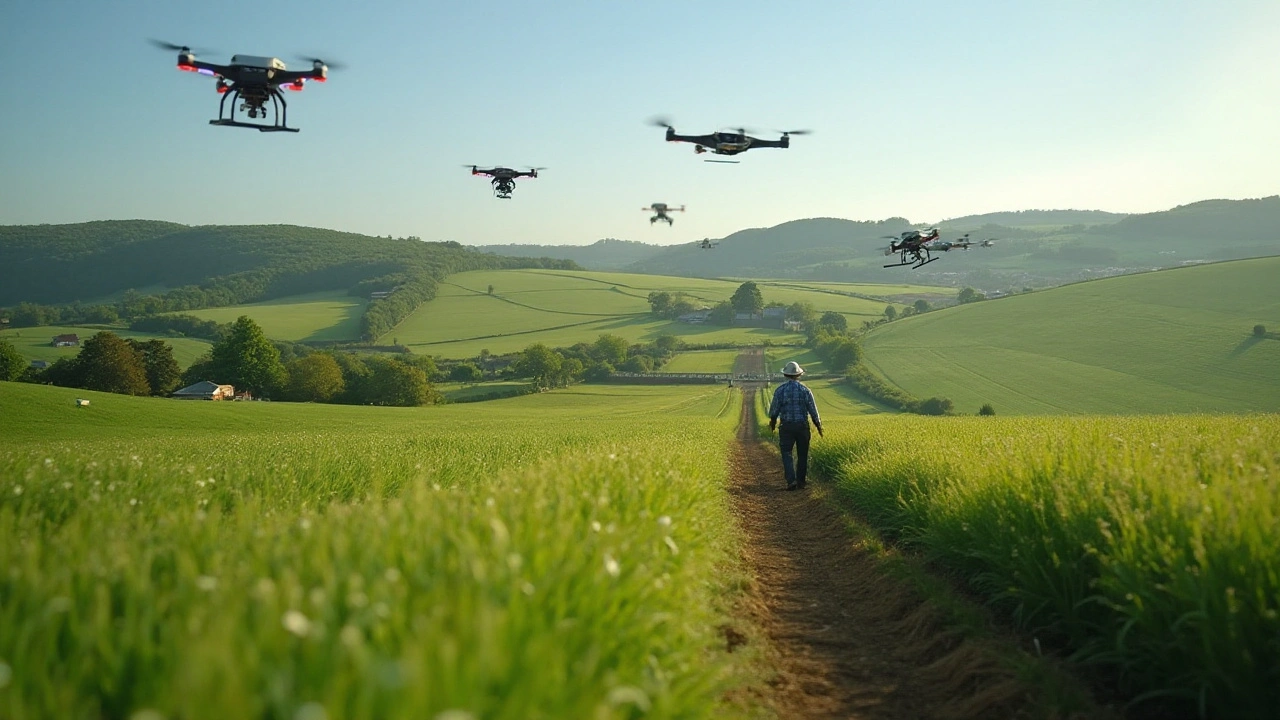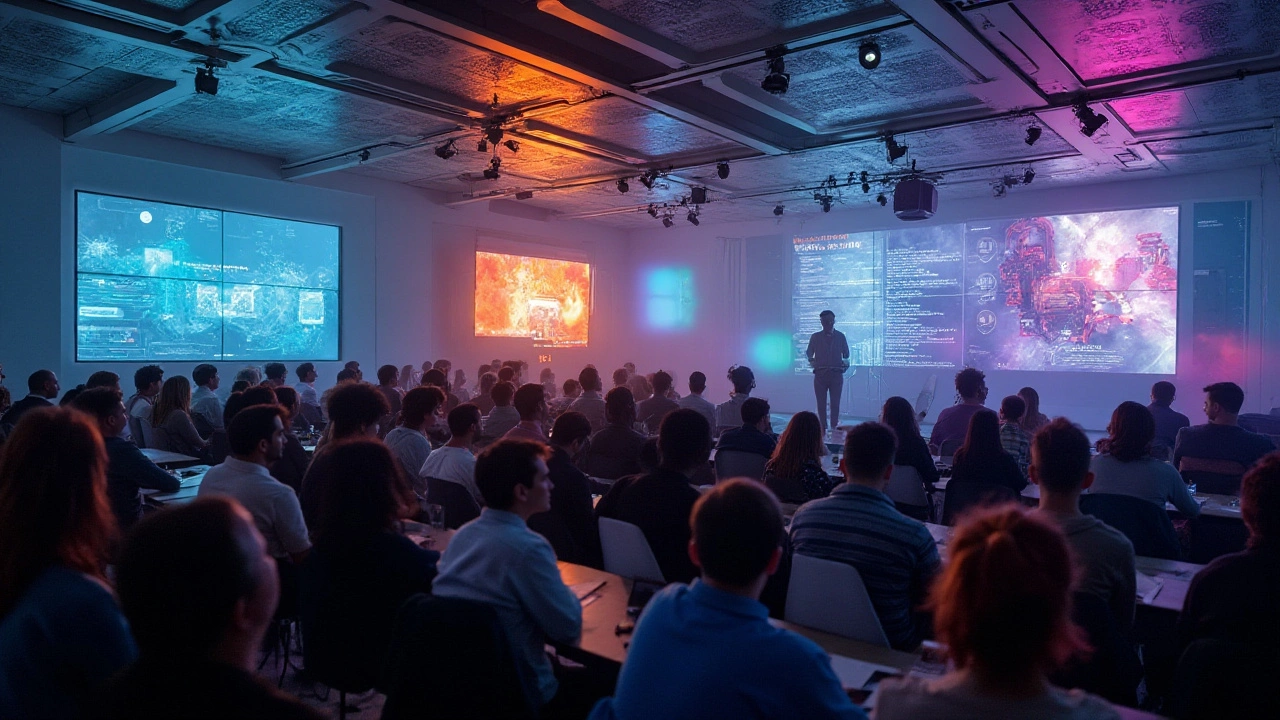The quest for Artificial General Intelligence (AGI) is one of the most ambitious in the field of technology. Unlike the specialized AI that we're familiar with today, AGI strives to achieve a level of comprehension and versatility akin to the human mind. As researchers delve deeper into uncharted territories, AGI's potential beckons with promises of endless possibilities. From transforming mundane tasks to solving some of the world's most pressing issues, AGI could indeed be the AI's masterstroke.
With its roots dating back decades, AGI continues to challenge both technologists and ethicists alike. Understanding the nuances of AGI requires a peek beyond the algorithms, into the very essence of intelligence. This unparalleled advancement in AI heralds a future where machines are not just tools but partners in innovation.
- Understanding Artificial General Intelligence
- Current Developments and Challenges
- The Potential Impact on Society
- Ethical Considerations and Future Directions
Understanding Artificial General Intelligence
The concept of Artificial General Intelligence (AGI) captures the imagination with its bold vision of machines thinking and learning like humans. At its core, AGI is about creating a form of intelligence that possesses a general application, capable of performing any intellectual task on par with the human mind. This is in stark contrast to the specialized AI we interact with daily, which, while impressive, can only outperform humans in narrowly defined tasks. The idea of AGI explores the boundaries of what we consider intelligence, pushing us to rethink the potential of machines in our world.
The journey toward AGI started long before AI became a common term. Early pioneers like Alan Turing and John McCarthy laid the foundation for the field, imagining computers that could simulate every aspect of human intelligence. Their visionary work set the stage for modern efforts to teach computers how to learn, reason, and adapt to new situations in a manner akin to human thought. This entails not just programming computers to follow set instructions but enabling them to develop their own understanding and strategies through experience and exploration, much like how a child learns.
The pursuit of AGI involves unique challenges, with topics like consciousness, understanding, and learning mechanisms gaining considerable attention. For a machine to truly achieve AGI, it needs to autonomously develop knowledge across a vast array of subjects, seamlessly transfer its learning from one domain to another, and exhibit creativity and innovation. These are not mere technical hurdles but philosophical ones, prompting deep reflection on the very nature of intelligence itself. As Murray Shanahan, a cognitive robotics professor, once remarked,
"To build a truly intelligent machine, one must understand how intelligence arises from biological systems."These complex demands place AGI at the intersection of various disciplines: neuroscience, computer science, linguistics, and more, each contributing essential insights.
The race to achieve AGI is not just academic; it holds the promise of radically transforming society. Imagine machines capable of understanding and contributing to human endeavors, from scientific research to creative arts to everyday problem-solving. Some experts anticipate AGI to revolutionize industries by offering unprecedented levels of automation and efficiency, while others foresee it as a tool for solving global challenges like climate change and healthcare. With its potential to adapt and innovate, AGI might one day address issues that require flexible and nuanced thinking, traditionally thought to be the sole preserve of humans.
The timeline for achieving AGI is a subject of much debate, with experts split on when, or even if, it will become a reality. Some believe significant progress could occur in the coming decades, thanks to advancements in deep learning and neural networks. Others, however, are more cautious, pointing to the gaps in our understanding of human cognition as a barrier. What remains clear is that the progress towards AGI is accelerating, propelled by the curiosity and determination of researchers eager to unlock this next frontier of AI technology.

Current Developments and Challenges
The journey towards achieving Artificial General Intelligence has been marked by rapid progress and a fair share of hurdles. At the forefront of these developments are initiatives by tech giants such as OpenAI and DeepMind. These organizations are harnessing the power of advanced computing to bridge the gap between narrow AI and the broader horizons promised by AGI. While AI systems like GPT, which powers various applications, showcase impressive capabilities, they still lack the cognitive depth that defines human-like intelligence. There's a continual effort to enhance machine learning algorithms to endow them with reasoning that can adapt and evolve much like our own minds do.
One exciting area of progress lies in reinforcement learning where AI agents learn through trial and error, mirroring a fundamental aspect of human learning. DeepMind's AlphaGo is a prime example, having surpassed human champions in complex games, yet this achievement only scratches the surface of AGI's potential. Researchers strive to create systems that not only emulate human problem-solving skills but also venture beyond predefined tasks. The context-awareness exhibited by human intelligence is something current AI is just beginning to embrace, revealing a path littered with bottlenecks pertaining to data interpretation and contextualization.
Yet, these strides bring hefty challenges, particularly concerning the unbounded nature of AGI's potential. One major challenge is ensuring that the growth of AGI aligns with ethical standards and societal welfare. Balancing the need for innovation with responsibility is not a simple endeavor, and this is where philosophical and technological dialogues converge. The question of how to maintain control over a potentially autonomous machine is not merely theoretical. It demands urgent attention if we are to prevent unintended consequences. A notable concern is decision-making processes within AGI systems that should be transparent, offering insights into how conclusions are drawn by these intelligent entities.
"Our responsibility is to guide AI's growth thoughtfully, ensuring we navigate the delicate intersection between technological capabilities and ethical duties," declared Dr. Jane Harper of the Center for AI Ethics. Her words underscore the philosophical meditations echoing across the scientific world as developers tread this pioneering path.
Moreover, there's a practical side to these challenges involving computational resources and energy consumption, which are significant barriers in scaling deep learning models that underpin AGI. Researchers are actively exploring more efficient algorithms and hardware advancements to reduce the environmental footprint of training choices. Addressing these operational challenges is crucial if AGI is to be sustainable and widely beneficial, rather than an exclusive tool wielded by those with vast resources.
Overcoming Resource Constraints
The development of AGI not only demands intellectual rigor but also enormous computational power. As AI models grow in complexity, so too do their demands for processing power and data. Current AI systems require thousands of GPUs and weeks of training time, raising questions about the feasibility of expanding these capabilities sustainably. Innovators are hard at work devising methods to improve efficiency, such as through the design of neuromorphic chips that mimic human brain architecture. Progress in this field could be the breakthrough needed to propel AGI forward, democratizing access to this frontier technology by lowering costs and energy needs.

The Potential Impact on Society
Artificial General Intelligence has the power to change our world in ways we've only imagined. Its profound ability to understand and interact with the world could turn industries on their heads, making some obsolete and others more efficient than ever. Imagine a world where Artificial General Intelligence optimizes energy use in homes and industries, potentially cutting carbon emissions significantly. The automation of complex tasks across sectors such as healthcare, finance, and transportation could save billions while improving accuracy and efficiency. The idea is not just to replace human roles but to augment them, making lives easier and broadening human capability.
But such profound change doesn't come without its challenges. An important question is what happens to jobs as AGI enters the workforce. History has shown that new technologies create new opportunities. However, with AGI's breadth of competencies, it could lead to significant economic shifts. There's a potential for heightened inequality if access to this revolutionary technology isn't equitable. Addressing this means we need to start thinking about new education models that prepare people for roles complemented by AGI rather than competing with it.
AI future could lead breakthroughs in scientific fields if harnessed responsibly. Consider its impact on healthcare: AGI could analyze vast amounts of medical data, aiding in the development of new treatments, and even speeding up the time it takes to find cures for diseases. In education, it could personal global learning experiences, adapting to each student's needs and learning style. According to a report by PwC, "The impact of AI on the global economy is expected to be as much as $15.7 trillion by 2030," capturing the grand scale at which this technology will operate.
"I imagine a world where we don't just coexist with artificial general intelligence but thrive alongside it. The potential for collaborative innovation could be unprecedented," suggests Dr. Emily Sanders, a leading researcher in the field of AI ethics.
Yet, with all its potential, AGI developments need careful oversight. The more we depend on technology, the more vulnerable society could become to abuses of power, whether through cybersecurity threats or privacy invasions. A robust ethical framework will be crucial. This oversight will involve cross-border collaboration among governments, private entities, and international coalitions to ensure AGI benefits all of humanity.
The road to an AI future both promising and secure is long. While AGI stands as the possible pinnacle of technological achievement, its development must remain thoughtful and intentional, balancing innovation with the welfare of society.

Ethical Considerations and Future Directions
The path toward developing Artificial General Intelligence is fraught with ethical considerations that demand our attention. AGI, with its ability to perform any intellectual task that a human can, raises questions that aren't easy to answer. One pressing concern is the displacement of jobs. While machines could propel industries to new heights, the same systems might render human efforts redundant, ushering in an era of technological unemployment. To mitigate such potential disruptions, a delicate balance must be struck between innovation and job retention. Creating new opportunities that AGI itself might drive is a promising way forward, ensuring both progress and prosperity.
Another aspect of ethical scrutiny is the control and safety of AGI. Imagine a machine with the intelligence of a human but wielding capabilities beyond our comprehension. The risks are immense if such a system acts contrary to human interests. Experts propose embedding core values and safety protocols within AGI systems. But this in itself raises questions about whose values are prioritized and who decides what's truly safe. A cautious approach with robust regulatory frameworks could help us navigate this tricky terrain. This is significant because if AGI systems go unchecked, it might not be long before our creation outpaces us, both in intellect and influence.
“The development of full artificial intelligence could spell the end of the human race. Once humans develop artificial intelligence, it will take off on its own and redesign itself at an ever-increasing rate.” – Stephen Hawking
The transparency of AGI systems is another critical aspect. Users must understand how decisions are made to trust and responsibly use these systems. Yet, the intricate algorithms can sometimes be a black box, making it hard to discern their inner workings. Demystifying AGI’s processes might be crucial for it to find a meaningful place in our society. By offering insights into these systems, we not only enhance user trust but also foster responsible use, which is essential as we incorporate AGI into daily life.
Looking ahead, the future direction of AGI involves collaboration and inclusivity. Engaging diverse communities worldwide ensures collective insights shape AGI development. Being inclusive means understanding the diverse societal impacts and potential benefits across various demographics. Research and policy efforts aimed at a global level can lead to solutions that benefit everyone rather than a select few. By weaving together international efforts and pooling resources, the path to AI's future could be one that reflects a shared vision, maximizing benefits while minimizing risks across the globe.

